When Can We Sing? Nola's NotesMoravian Music Lecture Rev. Nola Reed Knouse, Ph.D., Director of the Moravian Music Foundation. Nola
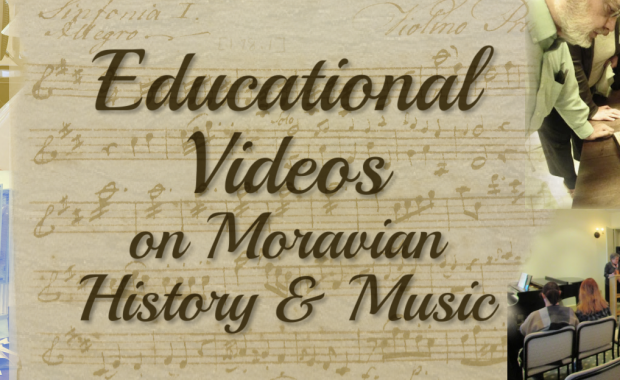
When Can We Sing? Nola's NotesMoravian Music Lecture Rev. Nola Reed Knouse, Ph.D., Director of the Moravian Music Foundation. Nola
Donut NV donut truck www.facebook.com/DonutNvAdvanceNC
Struggle Bus coffee truck www.facebook.com/thestrugglebus21
Patriot Pretzel Co. pretzels www.facebook.com/patriotpretzelcompany
The Southern Noodle www.facebook.com/TheSouthernNoodle/
Soul to Bowl https://www.facebook.com/SoultoBowl/
Taqueria El Tio https://www.doordash.com/store/taqueria-el-tio-winston-salem-24437932/
Fresh Catch https://www.facebook.com/FreshCatchSeafoodShack
Cilantro & Tacos https://www.facebook.com/CilantroandTacos/


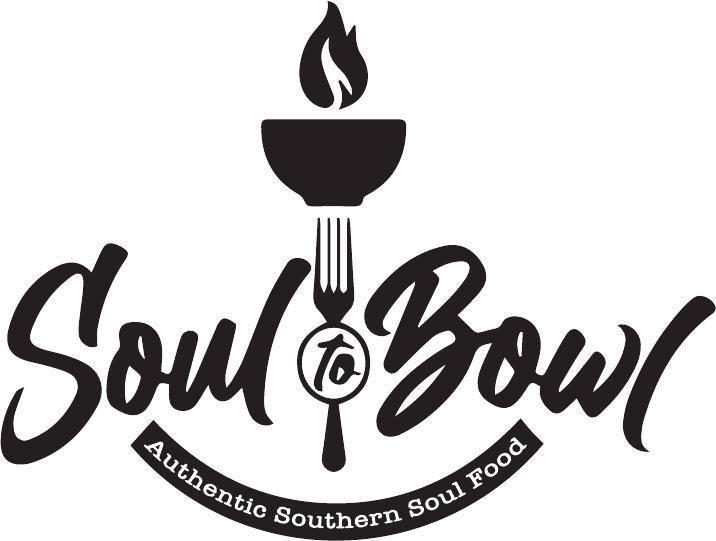
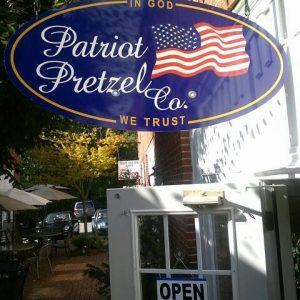
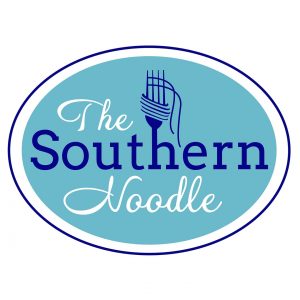


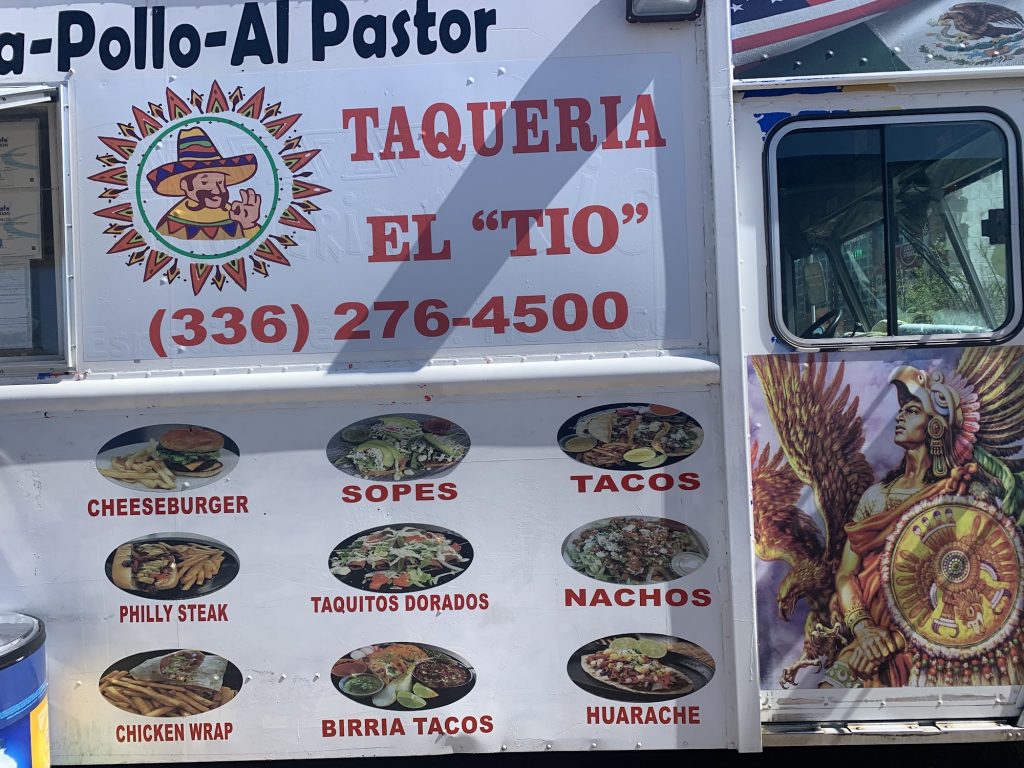
At Archie K Davis Center
Art C designs – Moravian gift items by LaDonna Crist
Handmade Stars by Susan Moore
Karlee Kreations – Cocoa Bombs
At Elberson Fine Arts Center
Artist, Laura Morales Studios
Kim Young – Kimy Krafts
Artist, Liz S – Elizabeth Stonich
Moravian Mercantile – Christmas gift items by Lauren Hatfield
Unity Women’s Desk – worldwide crafts
Hot Sauce Mall, Drake Lanier
All artists, vendors, exhibitors are subject to change.
MMFS1301 Glory to God in the Highest Gregor, Christian Luke 2:14
SSAB $1.75 Christmas
MMFS1908 Glory to God in the Highest Gregor, Christian Luke 2:14
SAB $1.75 Christmas
MMFS1003 Hail, Infant Newborn Michael, David Moritz Christmas hymn, anon.
SATB $1.75 Christmas
MMFS1401 Morning Star in Darkest Night Hellström, Georg Friedrich von Johann Scheffler (1624-1677)
SATB $1.75 Christmas
MMFS0802 Night of Holy, Highest Worth Brau, Christian Ludwig Christmas hymn, anon.
SSAB $1.75 Christmas
MMFS1806 O Dearest Jesus Hellström, Georg Friedrich von
S/SATB $1.75 Christmas
MMFS2101 Six Carols Clemens, Theodor Liley
SATB $1.75 Christmas
MMFS1714 Thou Child Divine Bates, James Text: anonymous
SATB $1.95 Christmas
MMFS1717 What Good News the Angels Bring Hagen, Francis Florentine William Hammond (1718-83)
SATB/SATB $1.95 Christmas
MMFS1001 Sing, O Ye Heavens Peter, Johann Friedrich Christmas hymn, anon.
SATB, S & T solos $1.95 Christmas, General
MMFS0804 Glory to Him Who Is the Resurrection LaTrobe, Christian Ignatius Text: John 11:25-26 SSAB $2.25
MMFS1307 And Yet Believe Henkelmann, Brian Text: John 29:29, adapted
SAB $1.75
MMFS1103 Glory to Him Wolf, Ernst Wilhelm
SATB $1.95
MMFS1303 Fling Wide the Portals Wolf, Ernst Wilhelm Text: J. G. von Herder
SATB $2.25
MMFS1304 He Who Died, Behold, Now He Is Risen Wolf, Ernst Wilhelm Text: J. G. von Herder
SATB $2.25
MMFS1305 O Death Now Is Swallowed Up in Victory Wolf, Ernst Wilhelm Text: J. G. von Herder
SATB/SATB
MMFS0907 Lord Christ Jesus, Our Salvation Henkelmann, Brian Text: verse 1, Jan Hus (circa 1410); verse 2, Ernst Christoph Homburg (1659)
2 part $1.75 Lent, Communion
MMFS0807 Wounded Lamb! By Your Self-Offering Mozart, Wolfgang Amadeus Text: Holy Communion hymn, anon.
SATB $1.95 Lent, Communion, General Use
MMFS1905 Kyrie White, James C. Text: Latin mass
SATB $2.25 Lent, General
MMFS1703 Lamb of God Erbe, E. I. Text: Latin mass, based on John 1:29
SATB $1.95 Lent, General
MMFS1705 Those Who Sow With Weeping Peter, Johann Friedrich Text: Psalm 126:5-6
SSAB $1.75 Lent, General
MMFS0801 Christ By His One Sacrifice Graun, Karl Heinrich Text: based on Hebrews 10:14, and an 18th century hymn
SATB $1.95 Lent, General
MMFS1111 In Truth, He Bore Our Affliction Graun, Karl Heinrich Text: Isaiah 53:4-6
SATB 1.75 Lent, General
MMFS0909 Christ, and Him Crucified Knouse, Nola Reed Text: Liturgy for Lent (from the Moravian Book of Worship)
SATB $1.75 Lent, General
MMFS1302 Lord of Life (The) Wolf, Ernst Wilhelm Text: J. G. von Herder
SATB $2.25 Lent, General
MMFS1716 Truly He Has Borne Our Frailty Herbst, Johannes Text: Isaiah 53:4-5
SATB $1.95 Lent, General
MMFS0904 In Stillness Gregor, Christian Text: adapted from Exodus 31:17, 16:23
SSAB, flute, ‘cello $1.75 Lent, Great Sabbath
MMFS1501 Behold, O There’s a Sight Peter, Simon Text: Christian Gregor
SATB $1.75 Lent, Maundy Thursday
MMFS0803 Throw Wide the Door Michael, David Moritz Georg Weissel (1590-1635)
SATB $1.95 (for Advent, Christmas, Palm Sunday)
MMFS1109 Prepare Your Hearts Peter, Johann Friedrich (1746-1813)
S/SATB $1.95 (for Advent/Christmas)
MMFS1901 People, Arise Reissiger, Karl Gottlieb (1798-1859) Isaiah 60:1
SATB $1.75 (for Advent/Christmas/Epiphany)
The archival holdings of MMF are divided into collections. (some in Bethlehem, some in Winston-Salem)
The FINDING AID for each collection is a “30,000-foot view” of the collection in its context. Each finding aid contains information about the size of the collection, how it was created, history of the community or key individuals involved in the collection, and a description of the contents.
Individual Finding Aids LINK
Guide: A searchable table of all collections LINK
GemeinKat is the MMF digital catalog on WorldCat.org LINK
WorldCat.org: to search the catalog, go to https://moravianmusic.on.worldcat.org/discovery. You can search by composer, title, collection, or any number of other keywords; just go try!
OCLC (Online Computer Library Center): the collective of organization(s) that built the online database called WorldCat. It is now owned by Backstage Library Works.
“GemeinKat” is the name given to MMF’s project to upload new and enhanced digital records to the OCLC and RISM databases. We have used the name “GemeinKat” as our umbrella term for the entire project, involving Backstage Library Works, OCLC, WorldCat, and RISM and the work of cataloging; also, the creation of the digital records and the creation of finding aids.
GemeinKat is available to the public, on the internet, at moravianmusic.on.worldcat.org and is a WorldCat Discovery catalog, developed by OCLC, a nonprofit organization that provides services to thousands of libraries worldwide. Through WorldCat, users have the potential to access more than 1.8 billion items in libraries around the world.
GemeinKat itself is: the bibliographic records for each manuscript, book, or printed music item found in MMF holdings.
These archival holdings are grouped by collections and physically reside in either the Bethlehem or Winston-Salem archive (sometimes in both).
For a description, see the MMF website: https://moravianmusic.org/gemeinkat-catalog/.
THE MMF OFFICE IS NO LONGER IN THE ARCHIVES BUILDING ON LOCUST ST.!
OUR OFFICE IS ON CENTER ST., THEREFORE, PLEASE SCHEDULE VISITS SO WE CAN COORDINATE.
THANK YOU.
It is required that you make an appointment with MMF staff for consulting or to do research, so that we may access and prepare materials for you.
www.moravianmusic.org
For shopping, you may visit MMF in Bethlehem any day of the week. The Archives staff will accept payment and complete your purchase.
When convenient, you may consider ordering items on the MMF website. We can save you shipping charge if you want to pick-up the items. Please email sales@moravianmusic.org
For anthem and lending library requests, research inquiries about any of out collections, and other inquiries,
you are welcome to send an email to jan@moravianmusic.org, info@moravianmusic.org or
directly to any of the staff, using this pattern: [first name]@moravianmusic.org
We have recently upscaled our gift shop to include local Moravian vendors, like ArtC Designs and Handmade Stars.
The Moravian Music Foundation welcomes students for internships.
Both college (or higher) and high school levels may be accommodated.
Some projects require no musical experience; others require ability to read music and understand orchestral scores/parts.
RISM: Répertoire International des Sources Musicales
RISM, or International Inventory of Musical Sources, is an international, non-profit organization that aims to comprehensively document extant musical sources worldwide: manuscripts, printed music editions, writings on music theory, and libretti that are found in libraries, archives, churches, schools, and private collections.
Search RISM ONLINE (more searching options and granularity for scholars) or Search RISM CATALOG (more general searching)
The RISM Catalog of Musical Sources contains over 1.2 million records and can be searched at no cost. Early western music from 1600 through to the early 19th century is included.
RISM was founded in Paris in 1952 and is the largest and only global organization that documents written musical sources. RISM records what exists and where it can be found. RISM is where scholars go when they are looking for music manuscripts or early prints around the world. RISM entries include the musical incipits – the first phrase or so of music – to enable identification of a specific piece of music (which setting of “Sing to the Lord a New Song” is this?).
presented by the Moravian Historical Society, Aug. 28, 2022, to
GWYNETH MICHEL
Asst. Director of the Moravian Music Foundation
in sincere appreciation of her contributions in support of the MHS.
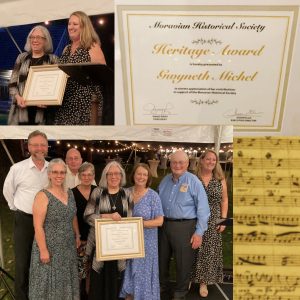
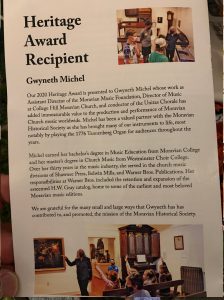
Growing up in the Moravian Church, I learned the value of the church and the importance of its long and remarkable history, both locally, but also internationally. My own family lineage can be traced back to the Bethabara settlement, so there is a strong personal connection that draws me to the work of the Moravian Music Foundation and the preservation of its remarkable archival collection. While an undergraduate at the University of North Carolina at Chapel Hill, I had the privilege of interning one summer at the Foundation under Nola Reed Knouse. This opportunity solidified my passion for musicology and is what ultimately inspired my pursuit of a doctorate in that area. In many ways, I owe my career to the Foundation and consider this opportunity to be both a literal and spiritual homecoming.
Looking to the future, I am excited by all the possibilities, including expanding the lecture series, building a more robust online presence, providing live music performances, creating workshops for local students, and working to tell the global story of the Moravian Church more completely and accurately.
My family has deep ties to the area that go back several generations. My wife, Erin, and I are excited to be moving back to Winston-Salem and to raise our daughter, June, in this community that played such a vital role in shaping who I am today. We are looking forward to exploring all the new restaurants, hiking around Pilot Mountain, and enjoying the vibrant cultural community that has grown over the years. After having lived in New York City for the bulk of our adult lives, we are delighted to be back in the land of BBQ, Cheerwine, and the Heels. -Chris Ogburn
What an honor it is for me to join the Moravian Music Foundation. I look forward to working with the board, staff, and community as we plan for the next 66 years. The mission and vision of the Moravian Music Foundation is as important now and for the future as it was at inception 66 years ago. I am grateful to be leading an organization that is respected throughout the globe for its collection and significance, due to Dr. Knouse and the team. As my wife and family transition to the beautiful city of Winston-Salem, we ask for your prayers and look forward to meeting each of you very soon! -Bruce Earnest
Psalm 99:5
ArchiveGrid LINK
This is a collection of over 7,000,000 archival descriptions, including documents, personal papers, family histories, and other archival materials held in about 1,500 archival institutions. ArchiveGrid helps researchers looking for primary source materials, but who may not know exactly where to go to find them. MMF’s finding aids can be discovered through ArchiveGrid. For an example, go to https://researchworks.oclc.org/archivegrid/help/; type in the search box (upper right) “Bethlehem congregation” and the first thing you will find is MMF’s finding aid for the Bethlehem Congregation Collection, and also related collections and suggested search terms (Lancaster, Dover, Lititz, etc.), linked to those finding aids on the MMF website.
Dear MMF,
I have a question about copyright and streaming. We have CCLI license and streaming license at my church, but it does not cover many pieces for organ. Would the ASCAP license provide that protection for us to stream and include copyrighted organ music? I’ve read their website, and it seems like it would. https://www.ascap.com/music-users/types/church-or-ministry
Thanks!
____________________________________________________
Dear Worship Leader,
We have been instructing folks to follow CCLI and OneLicense guidelines, which, as you discovered, unfortunately, rarely cover instrumental/keyboard music.
Yes, it appears as though ASCAP offers a “WorshipCast” streaming license, which is set up in much the same manner as CCLI and OneLicense licenses – i.e., the fee structure is based on worship attendance:
https://apps.christiancopyrightsolutions.com/purchase-license.aspx?svc=wc
A quick click brought up this fee structure:
1 – 199 (in attendance): $284.00
200 – 499 (in attendance): $424.00 (obviously it goes up from here)
Some further good news – the WorshipCast license offered above is controlled by Christian Copyright Solutions (a division of CCLI, and it appears as though purchase of this license would allow you to broadcast both ASCAP and BMI titles, opening up even more possibilities.
I don’t think, however, that this license includes SESAC titles; thus, if you wished to perform anything under the SESAC umbrella (Dan Gawthrop, for instance), you would need to approach that entity directly for a license:
Thank you for bringing this to our attention.
Blessings to you in your music ministry!
Gwyneth Michel, Assistant Director, Moravian Music Foundation – – (with edits by Erik S.)
MMF Lecture Videos
MMF Concert & Recital Videos
Music Videos
Educational Videos
Construction began on the building in the fall of 1999, and the facility was completed and occupied in July 2001. In September 2001, the building was dedicated as the Archie K. Davis Center. More about the man, the building, and a quick, visual tour of our beautiful home.
